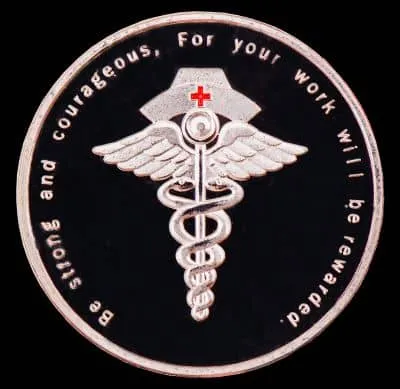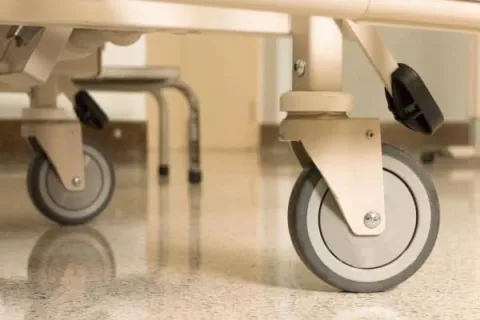Men in Nursing: No More Stigma

Women still make up almost 90% of the registered nurse population in the United States. But the number of men in nursing is now increasing. Because women have dominated the profession for more than a hundred years, nursing has been viewed as “women’s work” and therefore not an appropriate career choice for men. As American society has progressed, we’ve let go of these assumptions. More and more, people no longer view men as “unmanly” if they choose a career in nursing. Changing attitudes around who can participate in the profession makes the role more appealing for men in nursing.
In this blog, we’ll provide some history and context for how men were traditionally blocked out of the nursing profession, and how that has changed in recent decades. We will also examine the wide variety of roles and work options that are available for men who choose a career in nursing. We will also give you some pointers for what to look for when pursuing a nursing education.
If you are a male interested in nursing as a second career, read more to see if nursing is right for you.
Request Your Free Program Guide
Current Stats on Men in Nursing
These days, women still make up the vast majority of the registered nurse population in the United States. According to the U.S. Census Bureau’s American Community Survey for 2019, there were about 2.96 million female nurses in the country, compared to a little more than 397,000 male nurses. This data shows the percentage of male nurses at about 13% of the total, which represents a steady climb from roughly 2% in 1960, to 9.6% in 2018, leveling off at 13% since 2019.
The Projected Nursing Shortage
On the whole, nursing is a strong, recession-proof career choice. Even though nurses make up the largest group in the healthcare workforce (3.9 million in the U.S.), experts are concerned about nursing shortages. The American Nurses Association reports that more nurses are needed in the next two years compared to any other profession. According to projections from the U.S. Bureau of Labor Statistics, the nation will need an additional 220,000 nurses by 2029 to prevent a critical shortage. Men are needed in the field to meet those targets.
Here are four reasons for the nursing shortage:
- The United States population is in the midst of a bulge in the number of people over 65 as the baby boomer generation continues to retire. Many of these seniors are living longer than the generation that preceded them, but many are doing so with multiple acute or chronic health conditions that require medical and nursing care.
- Many nurses are entering retirement themselves. Nurses who are part of the baby boomer generation are retiring along with the other members of this large population group.
- Nurses face job burnout. Many nurses report physical and emotional exhaustion, as well as depersonalization and the loss of feelings of accomplishment as reasons for leaving their positions. Beyond the normal job stressors, COVID-19 has added an incredible burden for nurses, both at work and at home.
- Some women leave nursing—either temporarily or permanently—due to family or other responsibilities.
For these reasons and more, there is a great need for men to enter the nursing field. Men in various career stages—from recent workforce entrants to seasoned professionals choosing a different career—can bring new blood and strengthen the numbers of nurses working in the nation.

History of Female vs. Male Nurses
For most of the 20th century, professional nurses were almost entirely women. This came about in large part because Englishwoman Florence Nightingale—who many consider to be the progenitor of modern nursing—made a strong case for the competence of female nurses to tend to troops during the Crimean War (1850s). She then went on to establish formal nursing schools that barred male students. A similar path was charted in the U.S. by Clara Barton, a battlefield nurse during the Civil War.
Up until that time, men performed nursing duties alongside women in Western society. Most people believed nursing required strength and bravery—typically viewed as male traits—to cope with dangerous epidemics and the physical rigors of moving infirm people’s bodies around.
From the middle of the 19th century forward, nursing as a female-only profession became virtually set in stone. When the U.S. Army organized the Army Nurse Corps to care for wounded troops during World Wars I and II, men were not permitted to join.
Women Tend to Choose Nursing as a Career
For many decades thereafter, women chose nursing as one of a handful of careers they could pursue—along with teaching and secretarial work, among others—without facing rampant sex discrimination. Society held the role in high regard. Nurses faced a rigorous but rapid educational pathway and enjoyed good financial compensation as a result. Within the field, many women made significant accomplishments for themselves professionally and for nursing in general.
Men in Nursing: Why Men Enter the Field
Men have cited many factors that influence their decision to enter nursing. For many, the field is a reliable career choice—wages have grown steadily since 1980 and demand for nurses has never dropped. Other men enjoy the variety of specialties to explore and opportunities for advancement as an RN or, with additional degrees, roles in management and greater autonomy as a nurse practitioner.
Men can take up the nursing profession because society is changing its attitudes about nursing being a profession only for women. Men can take up the profession without the stigma that once surrounded being a male nurse. Some men also point to nurses in their families who influenced their consideration of nursing as a career.
Perhaps the most underrated reason to enter nursing, however, is the emotional reward that comes from helping people. “You’re a caregiver, providing quality, dignified care. It’s not you doing it as a male or a female, but just generally as a caregiver,” says one family practice nurse.
Male Nurses Among Black, Hispanic, and Asian Groups
Opportunities for men in nursing are increasing for men from many different racial and ethnic groups. The Journal of Nursing Regulation cited a survey that provided figures for male registered nurses as a percentage of their racial or ethnic group.
- African American: 8% male — 92% female
- Asian: 16% male — 84% female
- American Indian/Alaska Native: 14% male — 86% female
- Native Hawaiian or other Pacific Islander: 15% — 85% female
- Hispanic/Latino of any race: 16% male — 84% female
- White/Caucasian: 9% male — 91% female.

Men in Nursing: Fully Capable of Caregiving
One myth that has clung to the concept of male nurses is that they lack the “natural” compassion and caregiving qualities of women. For nurses engaged in patient care, there will be less concern about gender and more attention paid to competence and caring. Men in nursing are certainly able to deliver care with compassion, sympathy and even humor when it is needed.
There will be times, however, when a male nurse can provide a certain kind of support to male patients. Given how drafty hospital gowns may be one of the cruelest equalizers ever created—not to mention a challenge to one’s modesty—there are boys and men who feel more comfortable with a male nurse. Just having a man in the room might allow male patients to let down their guard and lessen any anxiety, which can help the patient’s mood and recovery. Having a male nurse perform certain, more intimate procedures, such as bathing, enemas or catheter insertion, allows some male patients to feel more at ease.
Career and Salary Outlook
As mentioned earlier, nursing is a field that continues to grow. There are many different opportunities for men in nursing, especially those who receive baccalaureate-level education. Many men choose nursing as a well-paying career with a variety of specialties and routes to advancement.
As the number of U.S. jobs in the industrial sector decline, men see that nursing is fairly recession-proof. “They’ll always need nurses,” says one former handyman who is now an emergency department nurse. “It can’t be outsourced; it can’t be automated.”
Plus, it offers something more: the knowledge that you have the ability to help someone when they are ill or in trouble. Many men realize what nurses have known for years—doing something meaningful for other people is its own form of reward.
That being said, salaries for RNs are quite good, depending on the location and hours worked. BLS data shows a median salary of $73,000 per year, or a little more than $35 an hour. With experience, additional education, or specialization, pay is even higher. For example, nurse anesthetists (Certified Registered Nurse Anesthetist, or CRNA) are Advanced Practice Registered Nurses (APRNs) and have a median salary of $181,040.
On the Job
The vast majority of registered nurses work in general medical and surgical hospitals. BLS data for 2019 showed these major categories of places where nurses are employed (rounded to the nearest thousand):
- Hospitals — 1.7 million
- Physician offices — 198,000
- Home health care services — 178,000
- Skilled nursing facilities — 151,000
- Outpatient care centers — 148,000
These numbers mean that roughly 60% of RN positions are attached to hospitals. But there is great variety in the roles that registered nurses can pursue both within and outside of the hospital setting.

Nurses in the Hospital Setting
A person delivering patient care at the bedside is a classic image of the nurse at work. What may be less obvious is the opportunity for specialization. As nurses gain experience in particular departments, they find the balance between the types of patients they like to work with, work that appeals to their intellect, and work that matches their skill set. According to an article citing U.S. Census Bureau data, 41% of men in nursing have gravitated to the following specialties (including Nurse Anesthetist, mentioned above):
- Emergency Room Nurse (also called Trauma Nurse): The ER handles a wide variety of patients, from kids needing stitches to patients in cardiac arrest. The variability in cases has great appeal for nurses who appreciate staying on their toes.
- ICU Nurse: Nurses who work in the intensive care unit undergo special training to assist patients with complex care needs. ICUs themselves are also dedicated to further specialization, such as the neonatal ICU (NICU) or cardiac ICU (C-ICU).
- Critical Care Nurse: Nurses in critical care units work with patients suffering from acute, life-threatening illnesses or injuries, such as burns or other trauma.
- Flight Nurse: These nurses care for patients transported by either helicopter or plane. In some cases, trauma patients are transferred to a facility that can handle their type of injury. In other cases, the patients face time-sensitive treatment windows that require care in a different location.
Although delivering care at the bedside is a primary role for most nurses, there are many other ways hospital-based nurses ensure patients and their families receive the best care with as little anxiety as possible.
- Nurse navigators help patients with long-term care needs, such as cancer patients or those with neuromuscular disease, work their way through hospital systems and processes. They are frequently called upon to explain stages of treatment and may even schedule a patient’s appointments in a wide array of departments.
- Case managers make sure that discharged patients leave the hospital with everything they need to continue their recovery at home.
- Informatics nurses work to keep medical data, such as Electronic Health Records, and hospital information systems working to benefit patient care and successful outcomes.
- Legal Nurse Consultants provide expert advice on medical matters in court or with insurance providers. While some Legal Nurse Consultants establish independent consulting practices, those who work for hospitals may work in risk management, case management or with concerns over licensure.
Men in Nursing Management
Men in nursing who seek promotion can look to many different roles that build on the clinical experience and education at the master’s or doctoral level. The Nurse Manager or Nurse Administrator position is usually given to a nurse with master’s-level or greater education who is then responsible for managing nurses, setting schedules, and conducting performance reviews. A nurse manager also works with medical staff and hospital administration on institutional priorities.
Male nurses may decide to join the ranks of nursing educators. Because of the national nursing shortage, the need for nursing faculty to educate new nurses is critical. Men can transition from clinical work to academics with a master’s degree, filling the role of adjunct faculty or clinical instructor. Positions as assistant, associate, or tenured professor are options for men with a PhD or DNP degree. Although numbers of male faculty members are low nationwide, there may be growth as more male students enter collegiate nursing programs. Some men in nursing academics proudly serve as deans of nursing schools.
Nursing and the Military—A Two-Way Street
Men who have served in the military may find that they want to pursue nursing as a career in civilian life. This might be especially true for those who served as medics.
U.S. Army medics receive 10 weeks of basic training plus 16 weeks of specialized training similar to programs for civilian emergency medical technicians (EMTs). Other military branches and service groups, including Special Operations teams, have their own training programs that allow wounded troops to receive care when they are deployed away from their base of operations.
Medics and other veterans and former military personnel can pursue a BSN (bachelor’s in nursing) degree at a qualified school. Some schools, like Marymount University, are veteran-friendly, providing assistance to ensure students have access to all of the funding sources available for which they are eligible. U.S. News & World Report has rated Marymount University #21 on its list of Best Colleges for Veterans. For those who want to become military nurses, whether they are enlisting for the first time or re-entering the service, a BSN is a requirement for nursing in each branch of service.

Correctional Health Care
Another area that men in nursing might want to look into is correctional nursing. Correctional nurses provide care for incarcerated populations in youth detention facilities, as well as adult jails and prisons. Individuals held inside these facilities have health issues just like in the population at large. Some have chronic conditions like asthma, high blood pressure, or ulcers that need periodic monitoring. In fact, the U.S. Bureau of Justice Statistics found that more than 40% of incarcerated individuals in federal or state facilities had a medical condition.
Two primary duties of correctional nurses are intake exams and medication administration. At other times, correctional nurses will have to handle medical emergencies. If an injury or acute illness requires inpatient care, the correctional nurse initiates or oversees transferring the patient to a hospital.
Even though the environment may not appeal to everyone, those who are committed to caring for the offender population derive the same satisfaction that all nurses experience when they can help people with health issues. Generally speaking, correctional nurses are expected to have been licensed and have some experience working in a hospital (particularly in an ER) or a similar setting.
Special training prepares nurses to deliver care to offenders safely and to cope with the stresses of working with people who have committed violent crimes. However, many correctional nurses have reported that they feel just as safe—if not safer—working inside a correctional facility than in a traditional hospital setting because security is a paramount concern. Nurses in this field may also wish to pursue training and certification from the National Commission on Correctional Healthcare.
The Future for Men in Nursing
Federal government statistics predict a 7% growth rate in the number of registered nurse jobs overall through 2029, a rate that is growing faster than average. (The growth rate for all jobs tracked by the BLS for the same period is 4%.) Men will undoubtedly be a part of this growing wave.
There will be new opportunities outside of or augmenting traditional clinical care. One health care development that sprang to the forefront due to the COVID-19 pandemic is the wider use of telehealth services. Patients are able to use their smartphones, tablets or computers to have virtual visits with their care team, and RNs are a key part of that relationship. This is especially helpful for patients who need medical education or support with chronic conditions. RNs can help physicians or other specialists manage aspects of patient care without the need for multiple office visits.

Online Nursing Degrees
A good nursing education is the foundation for anyone seeking to thrive in the field. Men with a bachelor’s degree in another field of study who are looking to make a career change into nursing can take advantage of online programs, such as the Accelerated Bachelor of Science in Nursing (ABSN) offered by Marymount University Online. The Washington, D.C.-based university has a great reputation—it has been ranked as a Best Regional University—South, and Best Value School—South by U.S. News & World Report; and a Veteran-Friendly Yellow Ribbon school by the Department of Veterans Affairs. Most importantly, all of Marymount’s online classes are accredited by the CCNE (Commission on Collegiate Nursing Education).
Students can pursue the majority of their coursework online and complete their BSN in the time it would normally take to earn an associate degree.
Request Your Free Program Guide
